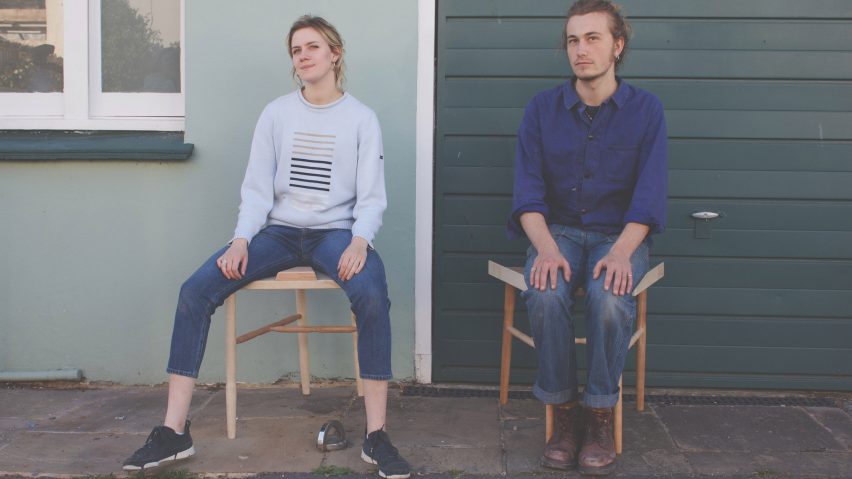This week on Dezeen, university graduates created problem-solving designs including an anti-manspreading chair that forces sitters to close their legs, and a masturbation suit for people with disabilities.
Brighton University graduate Laila Laurel designed a chair that prevents people from "manspreading", as a tongue-in-cheek response to day-to-day sexist issues experienced by women.
One chair is designed for women and encourages them to take up more space by sitting with their legs apart, and the other is for men, which forces them to sit with their legs together.
Chinese graduate designers Hsin-Jou Huang, Szu-Ying Lai and Chia-Ning Hsu developed a three-part masturbation kit for people with disabilities.
The sex-aid suit, called Ripple, includes a cushioned, inflatable body suit, a remote with a receiver, and an eye mask with earphones, which also releases pheromones.
From wearable technology to tech applied to the brain, Elon Musk revealed designs for an implant from his new start-up Neuralink that will connect human brains with computer interfaces using AI.
Tiny electrode "threads" attached to a micro-chip would be implanted into the brain by a neurosurgical robot, where they would detect electrical signals in the brain and wirelessly transmit this information outside the body.
Musk aims to use Neuralink to understand and treat different forms of brain or spine-related disorders, as well as granting humans "superhuman intelligence".
This week in transport news, Airbus revealed its Bird of Prey concept for a hybrid-electric airliner, which features feather-like tips on both the wing and tail structures.
Designed to show the potential of using biomimicry in aviation design, the aircraft's smooth body mimics the aerodynamic arch of an eagle or falcon.
British car maker Lotus also launched its first all-electric hypercar, the Lotus Evija, which features a one-piece carbon fibre chassis.
Labelled as the most powerful series production road car ever built, the Evija can go from zero to 62 mph in under three seconds, and can reach a top speed of more than 200 mph.
Over in the field of architecture, MAD's first European building – the UNIC apartment tower – is nearing completion in Paris.
The 13-storey residential building was developed in collaboration with local studio Biecher Architectes, and features balconies that will be fitted with planters to act as "raised gardens".
This week Foster + Partners also announced its plans to add a large overhanging rooftop extension to the Bilbao Fine Arts Museum in northern Spain to enhance the institution's "unique identity".
The extension forms part of the firm's wider renovation of the museum in partnership with local studio LMU Arkitektura.
Zahira Asmal, an urbanist from South Africa, also hit the headlines this week, as she was forced to cancel a planned lecture in London after a "humiliating" and costly experience when applying for a visa to visit the UK.
"In South Africa we welcome visitors from the UK with open arms, smiles, mountain walks and dinner invitations," said Asmal. "[In the UK] we are made to feel like criminals each time rather than collaborators and guests."
Asmal's withdrawal comes at a time of growing concern over the way overseas creatives, particularly those from Africa, are being treated when applying for UK visas.
Elsewhere in architecture news, digital design agency Squint/Opera envisioned what London would look like in 2090 when climate change has left cities submerged.
The series of speculative visualisations, which see London as an underwater city, show how citizens might adapt to catastrophic rising temperatures and sea levels.
Other popular projects this week include FORM/Kouichi Kimura Architects' Slender House in suburban Japan, Sleepbox's sleeping pods that were installed at Dulles International Airport in Washington DC, and the newly unveiled Olympic medals for the Tokyo 2020 Games.

